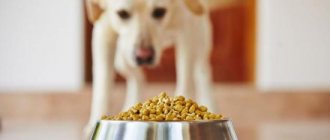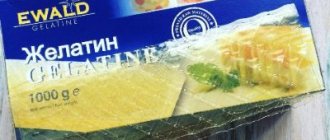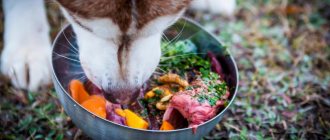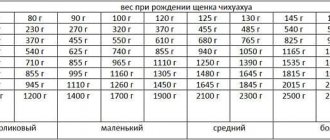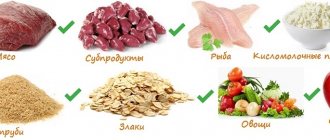Someone might be amused by a dog happily crunching an apple or plucking a berry bush in their garden plot. But this is not surprising, because fruits and berries for a pet are a natural dessert and a valuable source of vitamins. To pamper your pet with a healthy treat, you should find out what fruits dogs can eat.
Do you need fruits in your diet?
Today, domestic dogs are fed mainly industrial food. Despite this, the benefits of natural sources of vitamins, microelements, glucose, and fiber can hardly be overestimated. Even the most nutritious, balanced food cannot fully satisfy this need. The dog is the ancestor of wild wolves, an omnivore. And in nature, wild animals always eat fruits that fall from trees or feast on wild berries.
Fruits and vegetables are a natural source of nutrients. If your pet begins to show a strong interest in living plant foods, this is a reason to think about a possible lack of some microelements or vitamins in his body. In order to diversify and replenish the existing diet, you need to know which common fruits can be beneficially and safely given to dogs to eat, and which ones are undesirable or even prohibited.
For puppies
Veterinarians confirm the benefits of eating fruits. A dog should be taught to eat fruits, including pears, from puppyhood (1–3 months), giving a little at a time during play. During the training period, you can mix fruits with the main food. Each new fruit is introduced in small doses with monitoring of the animal’s well-being.
Follow simple rules when introducing fruits into your pet's diet:
- Introduce new foods into your dog’s diet gradually, in small pieces . After this, carefully monitor the health of your four-legged animal. You can increase the portion if there have been no changes in the behavior or condition of the pet (check for swelling, skin, eyes, stool, etc.).
- If the animal is not interested or flatly refuses to eat new treats, do not force it . It is quite possible that your pet smelled a low-quality product or components that were unpleasant to it.
- Add pieces of fruit and berries to warm porridge - this will make the main food more healthy and tasty.
- Buy ripe, high-quality fruits and regularly introduce them to your diet.
Allowed fruits and their benefits
- Green apples are the safest and most accessible fruit. Excellent supplier of vitamin C and fiber. Improves digestion and is an ideal treat for older dogs due to its low fat and protein content.
- Pears practically do not cause allergies and help reduce the risk of stroke. You need to give preference to hard varieties.
- Bananas are a source of potassium. But you need to avoid overripe fruits, which can cause digestive upset. And due to the abundance of sugar, it is not advisable to give it to dogs too often.
- Dogs can eat plenty of watermelons grown without the use of nitrates and various accelerators. Due to their composition, they are an additional source of water for the body in the hot summer. A side effect is frequent urination.
- Pineapples are rich in an enzyme that helps digest proteins - bromelain. Great as a dessert.
Negative consequences
When consumed as food, the risk of allergies in animals increases. However, allergic reactions are typical for most fruits that are given to dogs as an additive to the main diet. The owner’s task is to closely monitor the condition of his pet and the changes that may occur immediately after eating plums.
Symptoms
: sneezing, itchy skin, inflammation of certain areas of the skin.
What to do if your dog’s condition worsens
If this happens, contact the veterinarian immediately. Only an experienced specialist, based on clinical studies and blood tests, can accurately establish a diagnosis. Existing modern diagnostic and treatment methods make it possible to accurately determine the causes of an allergic reaction and minimize the negative consequences for the body. Naturally, fruits will have to be excluded from the dog’s diet.
It is possible, but very carefully
As a rule, exotic fruits pose a danger. Imported fruits brought from afar are treated with various chemicals before long transportation in order to maintain a beautiful presentation and protect against parasites.
Under no circumstances should you buy impeccable and perfect-looking imported fruits for pet food.
It should be understood that such products are brought to a beautiful state artificially, using toxic substances.
- “Slippery” fruit varieties such as melon, kiwi or plums stimulate intestinal motility and can cause diarrhea.
- A slice of pitted and peeled papaya, on the contrary, cures a slight upset stomach. But with frequent use, it increases blood sugar and contributes to the development of diabetes.
- Persimmon can also normalize broken stools. But it contains tannins in large quantities. Frequent use can lead to constipation.
- Peaches, peeled, are acceptable in small quantities. They are a good source of vitamin A.
Be sure to remove the pits before eating - they are poisonous to dogs due to their cyanide content.
The same caution applies to apricots. In addition, these fruits can weaken and can cause severe diarrhea, especially in puppies.
What fruits can dogs eat?
Dogs can eat almost any fruit as long as it does not exceed 15% of their daily diet. Additionally, we recommend offering your dog low-sugar fruits.
It's also important to remember that dogs hate the smell of citrus fruits. So while citrus fruits may be good for dogs, they are more likely to avoid it. So if you're wondering, can dogs eat oranges?? Yes, they can, but they may not want to.
Can dogs eat apples???
Yes! Apples are very beneficial for dogs, especially when treating diarrhea or avoiding constipation...
the Forbidden fruit
Separately, it is necessary to highlight those fruits that are strictly contraindicated for dogs:
- Grapes are the most toxic berry for dogs. The fruits of this vine conceal a mortal danger to the health of your four-legged pet. They negatively affect the functioning of the kidneys in the body - they can provoke kidney failure and problems with urination. Just a few berries can be a deadly treat for a medium-sized dog. The same goes for raisins. Even if the grapes were grown in an ecologically clean garden, without treatment with chemicals, it is still unacceptable to treat them to an animal.
- Pomegranate contains many acids that irritate the mucous membranes of the digestive tract. Bones also pose a particular danger.
- Citrus varieties - oranges, tangerines - are allergens and also irritate the sensitive walls of the stomach.
- Avocados are rich in a substance dangerous to animals called persin. May depress the functioning of the respiratory system and the heart.
Healthy berries
Berries are another acceptable and healthy treat. However, among them there are also varieties that pose a danger.
Sweet cherry pits contain cyanide and can become stuck in the throat if swallowed.
What berries can be included in your diet in moderation:
- One of the first summer berries is strawberries. Serves as a source of fiber and vitamin C.
- Blueberries are useful for antioxidants, vitamins A, E, K. This berry is often included in high-end industrial specialized feeds.
- Raspberries have anti-inflammatory properties. May be useful for older animals. It is also rich in vitamin C.
- Rowan has no contraindications and is a good source of microelements. Contains essential organic acids and pectin. There is more provitamin A in its ripe berries than in some vegetables, for example, carrots. It is advisable to get used to this berry from a young age.
Are fruit pits dangerous for dogs?
Contents hide
Are fruit pits dangerous for dogs?
It got warmer and greener outside. It was as if the long, grueling winter had never happened. And thoughts are more and more about summer - about the long-awaited vacation, beach holidays, berries and fruits. Of course, fruits are available in an assortment in any supermarket even in winter. And yet, let’s not argue: in the summer, fruits are present in our diet much more often. We choose not overseas, but “our own”, domestic fruits. Why not give your dog a treat? Tasty and healthy! But many fruits (in particular, peaches, apricots, plums, cherries) contain large seeds. Do they pose any danger? Let's find out!
According to experts, it is possible and necessary to give fruit to dogs. But be careful! Many dogs, by the way, are addicted to peach pits and persistently try to chew them. Often they are faced with severe “disappointment” - the bone does not give in. And often it is simply swallowed! And this is where the problems begin. Therefore, giving “stone fruits” to dogs just like that, in their natural form, is not a good idea.
Some bones pose a serious danger to dogs. And not only dogs, by the way! The pits (or rather, the kernels of the pits) of apricots, peaches, cherries and plums contain toxic hydrocyanic acid compounds. Just imagine what will happen when the dog finally gets to the core and chews it up! Of course, it is unlikely that an animal will become seriously poisoned due to one nucleolus. What if there is not one, but several? Here, as they say, options are possible.
In addition, it happens that the most common mold is hidden under the outwardly hard shell of the seed. Mold that has entered the body does not in itself bring anything good.
Be careful if you live in a private home with an orchard around it. Ripe fruits tend to fall to the ground, and your dog may well allow himself to eat them. A lot of fruit means, at the very least, a serious stomach upset is guaranteed.
Let's talk separately about rotting fruits. We all know that they can “ferment”, producing alcohol. Alcohol in all its forms is incredibly toxic to dogs - keep that in mind.
What else is dangerous about large bones? As we noted above, large bones are temptations for dogs. They zealously try to chew them, which seriously damages their own teeth. Damage to enamel is the least of the evils. Teeth sometimes crack and break, causing serious pain to your pet. And the treatment will cost you a pretty penny! Among other things, peach pits (and others) tend to damage the tongue and gums. Nothing good either.
Choking hazard. Go ahead. The bone may well clog the airways. The size is almost perfect, note. As a rule, the animal immediately panics and instinctively tries to inhale the bone into itself, which further aggravates the situation. If competent and timely measures are not taken, death is possible.
Accordingly, the smaller your dog, the greater the risks. Try to protect your baby even from cherry pits!
And so the bone was swallowed after all. It doesn’t matter in what form - whole or “parts”. It's hard to say which is worse. Imagine how much trouble it can cause in the esophagus or stomach with its sharp edges! Now let's try to understand what happens when the bone gets into the rectum. A disaster is possible!
We have not discussed all the risks. Fruit seeds are not as innocent as they seem. According to a veterinarian friend, cases of small bones getting into the lungs are not at all uncommon. The consequences of such a hit can be very sad.
Therefore, fresh and aromatic fruits in summer are certainly good. And there's nothing wrong with sharing them with your pet. But always remember about the treacherous bones!
Photo: nastroy.net (from open sources).


